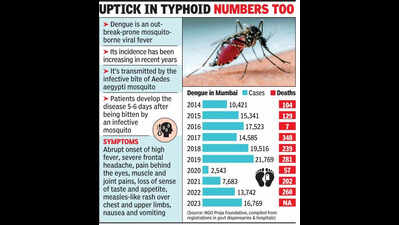Docs see rise in dengue & malaria cases as rains arrive early; BMC says no spike | Mumbai News – Times of India

Mumbai: The early onset of rains means the city is battling monsoon illnesses a month earlier than usual, with doctors reporting a noticeable rise in cases of dengue, malaria, typhoid and gastroenteritis.“In the last 15 days, I admitted more than a dozen dengue patients, including two needing ICU care,” said senior medical consultant Dr Gautam Bhansali from Bombay Hospital. A 70-year-old patient from Dahisar was brought a fortnight ago to the hospital’s casualty with high fever and a platelet count of 18,000, compared to the normal range of 1.5 lakh to 4 lakh per microlitre of blood. “She was in shock, a complication of dengue fever, and we feared the dropping platelet count would lead to internal bleeding. Moreover, she had diabetes and hypertension,” said Dr Bhansali. A 23-year-old male from Worli was the other ICU patient with a low platelet count of 22,000. Both have since recovered and were discharged from hospital.An uptick in dengue cases is usually noticeable in the last week of June, as patients with very high fever for multiple days and body aches, among other symptoms, seek medical attention. For instance, Mumbai registered 93 dengue cases in June 2024, 535 in July 2024, and 1,013 in Aug 2024. The city witnessed over 5,000 cases throughout 2024, according to BMC statistics.“Dengue cases have started rising early this year because of heavy rain for a few days last week,” said Dr Pratit Samdani from Breach Candy Hospital. Cases of malaria and chikungunya are also trickling in. “But there is no full-blown outbreak of these diseases so far,” said Dr Samdani.Dr Manjula Agarwal, an internal medicine specialist from Gleneagles Hospital, said apart from dengue and malaria, she is treating patients with typhoid and gastroenteritis, typically seen during the summer month of May when people consume contaminated juices or water. Dr Samdani said he treated multiple cases of liver abscess—a complication of consuming contaminated water or food. “These abscesses are caused by amoebic infection and need to be drained,” he added.BMC’s executive health officer Dr Daksha Shah said the civic public health machinery hasn’t noticed any spike in monsoon-related ailments so far. “Dengue is endemic to the city, and cases occur throughout the year.”Public health officials insist that dengue incidence seems to have multiplied in the last couple of years due to an increase in the number of sentinel survey centres. Around 1,000 cases of dengue were reported in Mumbai in 2022, but the numbers have increased four to five times since. Health activists, however, blame poor infrastructure in urban areas that leads to breeding of mosquitoes—malaria-causing Anopheles mosquitoes in dirty water and Aedes aegypti mosquitoes in clean water that accumulates on rooftops, flowerpots or discarded tyres.
















